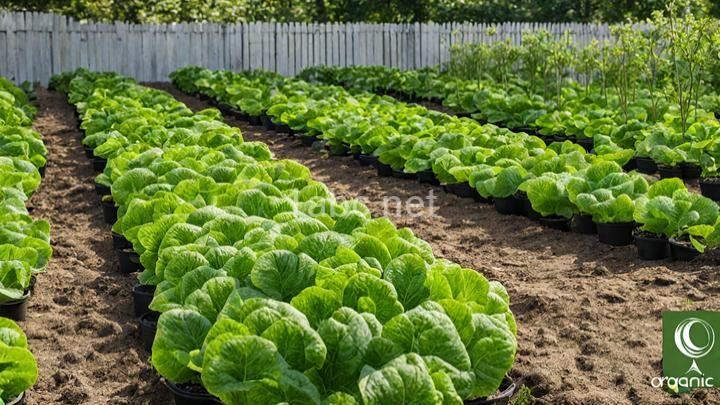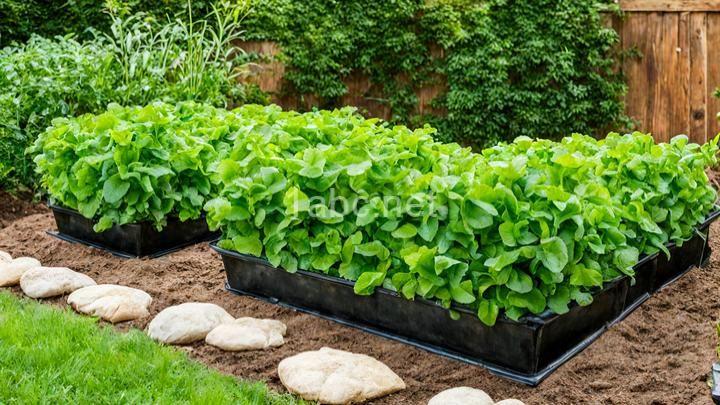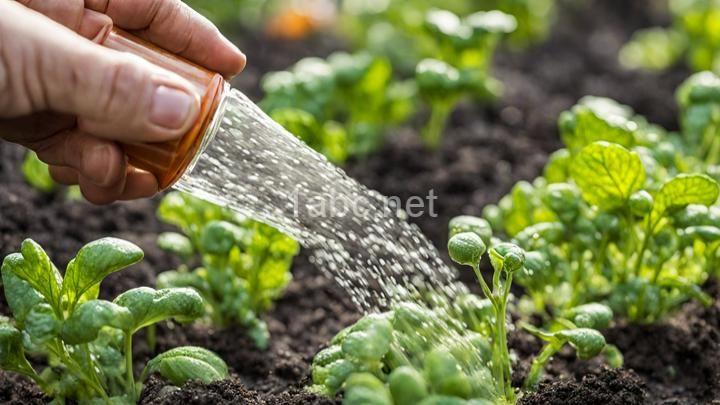Understanding the Organic Certification Process and its Significance in Gardening
Introduction:
Section 1: What is Organic Certification?
Section 2: The Organic Certification Process:
Step 1: Completing an application
Step 2: On-site inspection by a certified inspector
Step 3: Compliance with specific requirements
Step 4: Regular inspections to maintain certification
Section 3: Importance of Organic Certification in Gardening:
Section 4: Choosing Certified Organic Seeds and Plants:
Conclusion:

Introduction:
Are you passionate about gardening and want to make sure your produce is healthy and chemical-free? If so, you've come to the right place! In this blog post, we will dive into the world of organic certification and explore its importance in gardening. Whether you're a seasoned gardener or just starting out, understanding the organic certification process can help you make informed choices and ensure the health of your plants and the environment. So, let's get started!
Section 1: What is Organic Certification?
Organic certification is the process of verifying that agricultural products are grown and processed according to specific standards. The purpose of organic certification is to ensure that crops are grown without the use of synthetic pesticides, fertilizers, or genetically modified organisms (GMOs). By adhering to these standards, organic farmers prioritize sustainable farming practices and protect the health of consumers and the environment.
One of the key benefits of organic certification is that it provides transparency to consumers who value organic produce. When you see a product with the certified organic label, you can trust that it has undergone rigorous inspection and meets the strict criteria set by organic certifying bodies. This means that you can enjoy your fruits, vegetables, and herbs with confidence, knowing that they were grown without harmful chemicals or GMOs.
Section 2: The Organic Certification Process:
Now that we understand the importance of organic certification, let's take a closer look at the steps involved in obtaining it for a garden or farm.
Step 1: Completing an application
The first step in the organic certification process is to complete an application with a recognized organic certifying body. This application typically includes detailed information about the garden or farm, such as its location, size, and the crops or products that will be grown or produced.
Step 2: On-site inspection by a certified inspector
After submitting the application, a certified inspector will visit the garden or farm to conduct an on-site inspection. During this inspection, the inspector will evaluate whether the garden or farm meets the organic certification standards. They will assess factors such as soil fertility, pest control methods, and the use of approved organic inputs.
Step 3: Compliance with specific requirements
To obtain organic certification, gardeners must comply with specific requirements outlined by the organic certifying body. These requirements may include using organic inputs, maintaining soil fertility through composting or cover cropping, and implementing pest control methods approved for organic farming.
Step 4: Regular inspections to maintain certification
Once certified, the garden or farm will undergo regular inspections to ensure ongoing compliance with organic standards. These inspections help maintain the integrity of the organic certification and provide assurance to consumers that the products they buy continue to meet the organic criteria.
Section 3: Importance of Organic Certification in Gardening:
Now that we have a clear understanding of the organic certification process, let's explore why it is significant for gardeners like you.
One of the main reasons organic certification is important in gardening is that it ensures the health of plants, soil, and ecosystems. By avoiding the use of synthetic pesticides and fertilizers, organic gardeners prioritize the natural balance of the garden, allowing beneficial insects and organisms to thrive. This, in turn, helps maintain a healthy ecosystem and promotes biodiversity.
Organic certification also promotes sustainable farming practices. By focusing on soil health, organic gardeners improve the long-term fertility and structure of the soil, reducing the need for chemical inputs. This not only benefits the garden but also contributes to the overall sustainability of our food system.
Addressing common misconceptions about organic gardening is another significant role of organic certification. Some people may mistakenly believe that all gardening practices without synthetic chemicals are automatically organic. However, organic certification provides a standardized and regulated system that guarantees the authenticity of organic produce. It ensures that the products labeled as organic have undergone the necessary inspections and meet the stringent criteria set by the certifying bodies.
Section 4: Choosing Certified Organic Seeds and Plants:
When embarking on your organic gardening journey, it's important to start with the right seeds and plants. Here are a few tips on how to find certified organic seeds or plants:
-
Look for reputable seed companies with organic certifications: Many seed companies specialize in organic seeds and have obtained organic certifications. These certifications ensure that the seeds you purchase are truly organic and have been produced using organic farming methods.
-
Visit local farmers' markets or nurseries specializing in organic products: Local farmers' markets and nurseries often carry a variety of certified organic plants. By supporting these local businesses, you not only get access to healthy organic plants but also contribute to the growth of sustainable agriculture in your community.
-
Consider saving seeds from your own organically grown produce: If you have been practicing organic gardening for some time, you can save seeds from your own organically grown produce. This allows you to maintain the organic integrity of your garden and continue growing plants that are adapted to your specific climate and soil conditions.
Conclusion:
Understanding the organic certification process is essential for gardeners who value the health of their plants, the environment, and the well-being of consumers. Organic certification ensures that crops are grown without harmful chemicals or GMOs, promoting sustainable farming practices and protecting the ecosystem. By choosing certified organic seeds and plants, gardeners can further enhance their commitment to organic gardening and enjoy the benefits of chemical-free produce. So, let's prioritize the health of our plants and the environment by embracing organic gardening practices. Happy gardening!
Remember, if you have any questions or want to share your own experiences with organic gardening, feel free to leave a comment below. Let's continue the conversation and support each other on our organic gardening journeys!
FREQUENTLY ASKED QUESTIONS
What is the organic certification process?
The organic certification process is a rigorous and comprehensive procedure that ensures the organic integrity of products. It involves several steps and criteria that must be met to obtain organic certification. Firstly, farmers or producers must adhere to specific organic standards and practices. These standards vary depending on the country or region, but they generally involve the avoidance of synthetic pesticides, fertilizers, and genetically modified organisms (GMOs). Instead, organic farmers utilize organic-approved methods to promote soil health, biodiversity, and sustainable farming practices.
Next, the farmers or producers must submit an application to a recognized organic certification body. This application includes detailed information about the farm or production facility, such as the size of the operation, the types of crops or products being produced, and the farming practices employed.
Once the application is received, the certification body conducts an on-site inspection of the farm or facility. This inspection is carried out by a trained and qualified inspector who evaluates compliance with organic standards. The inspector assesses various aspects, including crop rotation, pest and weed control, livestock management, and record-keeping practices.
After the inspection, the certification body reviews the inspector's report and decides whether to grant organic certification. If all requirements are met, a certificate is issued, and the farm or facility can label their products as organic. This certification is typically valid for a specific period, often one year, and requires annual renewal to ensure ongoing compliance with organic standards.
Throughout the certification process, organic farmers and producers are subject to random inspections and periodic testing of their products to verify compliance. This monitoring helps maintain the integrity of the organic certification and provides consumers with confidence in the organic products they purchase.
It's important to note that the organic certification process can be time-consuming and costly for farmers and producers. However, it plays a vital role in maintaining the integrity and transparency of the organic food and agriculture industry.
Why is organic certification important?
Organic certification is important for several reasons. Firstly, it ensures that the products labeled as organic have been produced in accordance with strict standards set by certifying bodies. This includes the use of organic farming practices, such as avoiding synthetic pesticides, genetically modified organisms (GMOs), and artificial fertilizers.By obtaining organic certification, farmers and producers demonstrate their commitment to sustainability and environmental stewardship. Organic farming methods promote soil health, conserve water, and support biodiversity, thereby minimizing the negative impact on ecosystems.
Secondly, organic certification provides transparency and assurance to consumers. When a product is labeled as organic, consumers can trust that it meets specific criteria and has undergone rigorous testing. This allows individuals who prioritize organic products for personal health, environmental, or ethical reasons to make informed choices.
Furthermore, the organic certification process includes inspections and audits, ensuring that farmers and producers comply with the defined standards. This helps maintain the integrity of the organic label and prevents fraudulent practices.
In addition, organic certification opens up new market opportunities for farmers and producers. The demand for organic products is steadily increasing, and certification enables them to access premium markets and command higher prices for their goods.
Overall, organic certification plays a crucial role in promoting sustainable agriculture, protecting the environment, and providing consumers with reliable information about the products they purchase. It serves as a trusted marker of authenticity and quality in the organic industry.
How can I become certified organic?
To become certified organic, you will need to follow a few steps. First, you need to ensure that your farming or production methods align with organic standards. This includes using organic seeds and plants, avoiding synthetic pesticides or fertilizers, and implementing sustainable practices.
Next, you will need to find a certifying agency that is recognized by the government. They will assess your operations and verify that you meet the organic standards. It's important to choose a reputable agency that is accredited and has experience in certifying organic operations.
Once you have selected an agency, you will need to submit an application and provide detailed documentation about your farming practices, including your inputs, record-keeping systems, and any other relevant information. The certifying agency will review your application and may conduct an inspection of your farm or facility to ensure compliance with organic standards.
If everything goes well and you meet all the requirements, you will be issued an organic certification. This certification allows you to use the "certified organic" label on your products and gives consumers confidence that your products have been produced according to organic standards.
It's important to note that maintaining your organic certification requires ongoing compliance and regular inspections. You will need to keep detailed records, maintain your organic practices, and undergo periodic reviews to ensure that you continue to meet the organic standards.
Becoming certified organic can be a time-consuming and rigorous process, but it is worth it for those who value sustainable and environmentally-friendly practices in their farming or production methods.
Are there different levels of organic certification?
Yes, there are different levels of organic certification. Organic certification is a process that ensures products are produced and handled according to specific organic standards. These standards are set by different organizations, such as the United States Department of Agriculture (USDA) or the European Union (EU).In the United States, there are three main levels of organic certification:
-
100% Organic: Products labeled as "100% Organic" must contain only organic ingredients and have been produced using organic farming practices. These products can display the USDA Organic seal.
-
Organic: Products labeled as "Organic" must contain at least 95% organic ingredients. The remaining 5% can be non-organic ingredients that are approved by the USDA. These products can also display the USDA Organic seal.
-
Made with Organic Ingredients: Products labeled as "Made with Organic Ingredients" must contain at least 70% organic ingredients. The remaining 30% can be non-organic ingredients that are approved by the USDA. These products cannot display the USDA Organic seal but can mention the specific organic ingredients on their packaging.
It's important to look for the USDA Organic seal or other certification symbols to ensure the product meets the specific organic standards. Different countries may have their own organic certification programs, so it's always a good idea to familiarize yourself with the specific regulations in your region.
I hope this information helps! Let me know if you have any other questions.

